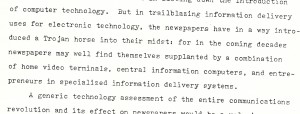Forgive this author a moment of own-horn-tooting.
It was always flattering and humbling to me to hear Dreaming in Code spoken of in the same breath as The Soul of a New Machine. With Say Everything I also had a model in mind: Hackers, Steven Levy’s groundbreaking and still-valuable account of the pioneering mavericks of hacker culture — which first taught me, back in the early ’80s, that there was a fascinating and important cultural story brewing in the computer rooms I’d haunted as a high-school student. In fact, we considered titling the book Bloggers, partly as homage to Levy’s work.
So you can imagine my delight at reading what Levy had to say about Say Everything in an article on the year’s notable technology books in Strategy and Business:
Say Everything is not only a delightful history of the form but a surprisingly broad account that touches on a number of major issues of the past decade, quietly making a case that blogs now play an indispensable role….
Rosenberg’s approach is to tell the stories of the storytellers, constructing his brief history of blogging by way of the bloggers themselves. He does this so well that it appears almost serendipitous that each aspect of his subject is almost perfectly embodied by the story of one or two individuals….
Rosenberg is a mensch, resisting cheap shots even when his subjects behave badly. But he is quick to puncture pretense, whether it comes from the self-importance of bloggers suddenly thrust into the public eye, or the snobbery of mainstream media dismissing citizen postings because their authors lack the training or credentials to participate in a national discussion…
Ironically, Rosenberg’s extended encomium of blogging also turns out to be an implicit defense of another allegedly endangered form: the book. Only by such an extended and well-organized presentation can Rosenberg both give us a comprehensive account of blogging and successfully argue for its importance. The pages of Say Everything provide not only an expertly curated burst of information, but also entertainment for several evenings. The book provides thought and provocation. It illuminates the deep economic challenges of the Internet. And, as is the case with blog postings, Rosenberg speaks with the clarity and wit of an authentic voice — even after the highly filtered, far-from-real-time processing of a major publisher. That’s why I think Say Everything is the best technology-related business book of the year.
OK, </blush>. And thanks!

 I was cleaning out my garage recently, combing through some old files, and stumbled on a research paper I wrote in 1981 as a senior in college. The title was “The Electronic Newsroom and the Video Display Terminal.” I was writing about the moment that the digital transition rolled out from the back shop to engulf the newsroom, as — almost overnight — the typewriters were put out to pasture and a generation of journalists learned to love cut/paste and the “delete” key. What would that mean for the future of news?
I was cleaning out my garage recently, combing through some old files, and stumbled on a research paper I wrote in 1981 as a senior in college. The title was “The Electronic Newsroom and the Video Display Terminal.” I was writing about the moment that the digital transition rolled out from the back shop to engulf the newsroom, as — almost overnight — the typewriters were put out to pasture and a generation of journalists learned to love cut/paste and the “delete” key. What would that mean for the future of news?